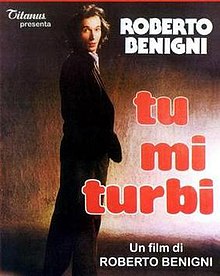Tu Mi Turbi
| Tu mi turbi | |
|---|---|
 |
|
| Directed by | Roberto Benigni |
| Produced by | Ettore Rosboch |
| Written by |
Roberto Benigni Giuseppe Bertolucci |
| Starring | Roberto Benigni, Nicoletta Braschi, Claudio Bigagli |
| Music by | Paolo Conte |
| Cinematography | Luigi Verga |
| Edited by | Gabriella Cristiani |
| Distributed by | Mario Cecchi Gori & Vittorio Cecchi Gori |
|
Release date
|
1983 |
|
Running time
|
85 min |
| Country | Italy |
| Language | Italian |
Tu mi turbi (also known as You Upset Me and You Disturb Me) is a 1983 Italian anthology comedy film written, directed and starred by Roberto Benigni. It is both the directorial debut of Benigni and the film debut of Nicoletta Braschi.
The film is divided into four episodes. In the first of these, the pastor Benigno is called by Mary of Nazareth and Joseph to take care of the newborn baby Jesus, who proves to be a brat. He performs a spiteful miracle series, including that of floating in the tub where he has to swim. Benigno confesses to the baby to being hopelessly in love with Mary, but he has to resign, because the Madonna has now taken a husband.
The tramp Benigno desperately searches for his beloved angel of heaven named Angela. When he gets information from other angels about the pure soul, Benigno discovers that she is in love with God, and that the two are getting married.
Still unemployed, Benigno goes to the bank to get a loan for the purchase of a home, being homeless. He is sent by the Director, with whom he begins to fight. In fact, the businessman wishes to know whether the tramp has some money stored in some other bank, so that he can steal it; but Benigno gets angry and, not understanding the corrupt system of bank lending, creates a comical comparison between the banking system and that of the greengrocers. At the end the Director, exasperated, puts Benigno in jail.
The two soldiers Benigno and Claudio are doing the night guard in Rome, at the Altar of the Fatherland, the tomb of the Unknown Soldier. The two begin chatting about communists, and after some reasoning about death in war, Benigno demonstrates with great wonder that God exists.
...
Wikipedia
